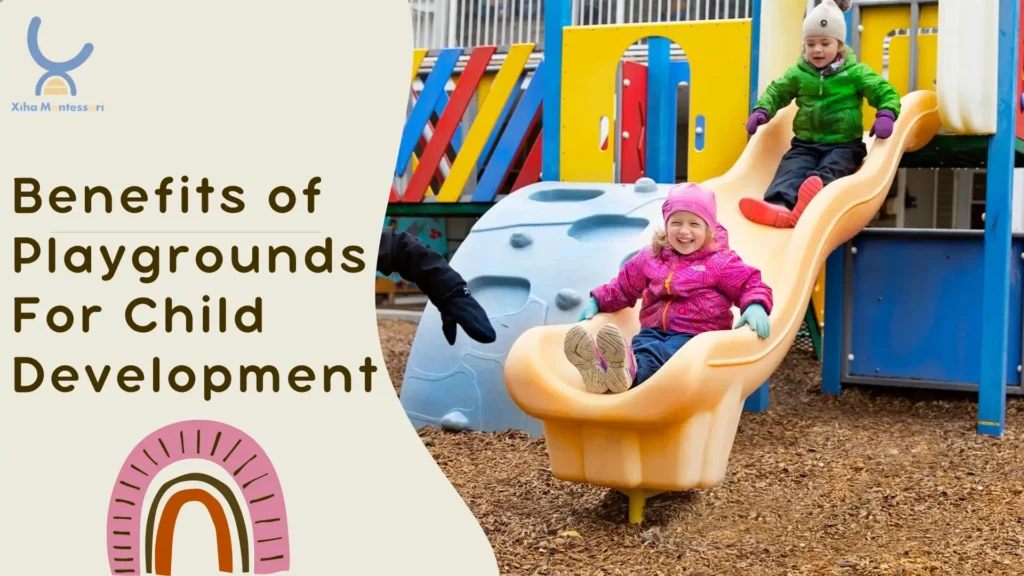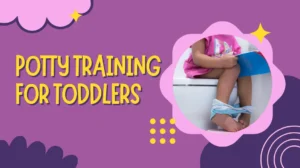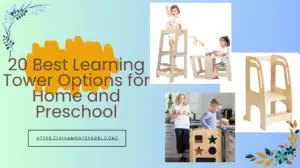Children are naturally drawn to playgrounds, a place where they can run, jump, and play to their heart’s content. But did you know that playgrounds are not just a source of fun for kids? There are also many benefits of playgrounds for child development.
The benefits of playgrounds for child development are manifold.Playgrounds provide a unique environment where children can enhance their physical abilities, develop social skills, experience emotional growth, and engage in cognitive challenges. In these outdoor environments, activities such as climbing, swinging, and interacting with peers help children develop as a whole. Through play, children learn to navigate their surroundings, work with others, solve problems and manage emotions.
Playgrounds offer a variety of benefits for child development, providing a safe and stimulating environment for children to grow, learn and have fun. As parents and caregivers, it is important to recognize the benefits of playgrounds and encourage our children to get out and play because the benefits go far beyond having fun.
Learn through games
The playground is a classroom without walls, where lessons are learned not through textbooks, but through the universal language of play. Here, every slide, swing, and sandbox serves as a foundation for developing a range of skills crucial for a child’s holistic growth.
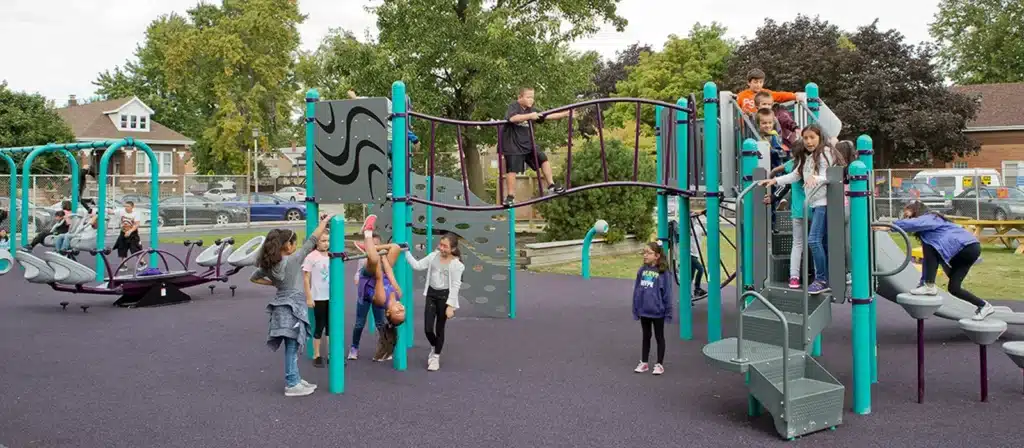
- Coordination
- Motor skills
- Cognitive ability
- Social awareness
- Language
- And more
Where the lessons of life are experienced through the joy of play. The benefits of playgrounds are just the beginning. As we delve deeper into the role of playgrounds in child development, these spaces are integral to the development of well-rounded, capable and healthy individuals.
Physical benefits of playgrounds
Playgrounds are not just play spaces; they are arenas for physical development and well-being. Each component of the playground, from the simplest swing to the most complex climbing structure, is designed to challenge and develop young bodies in unique ways.
The CDC recommends that children be moderately to vigorously physically active for at least 60 minutes a day, and playgrounds are the best place for this activity. Activities such as slides, swings, and climbers help children develop strength, reaction time, balance, and coordination.
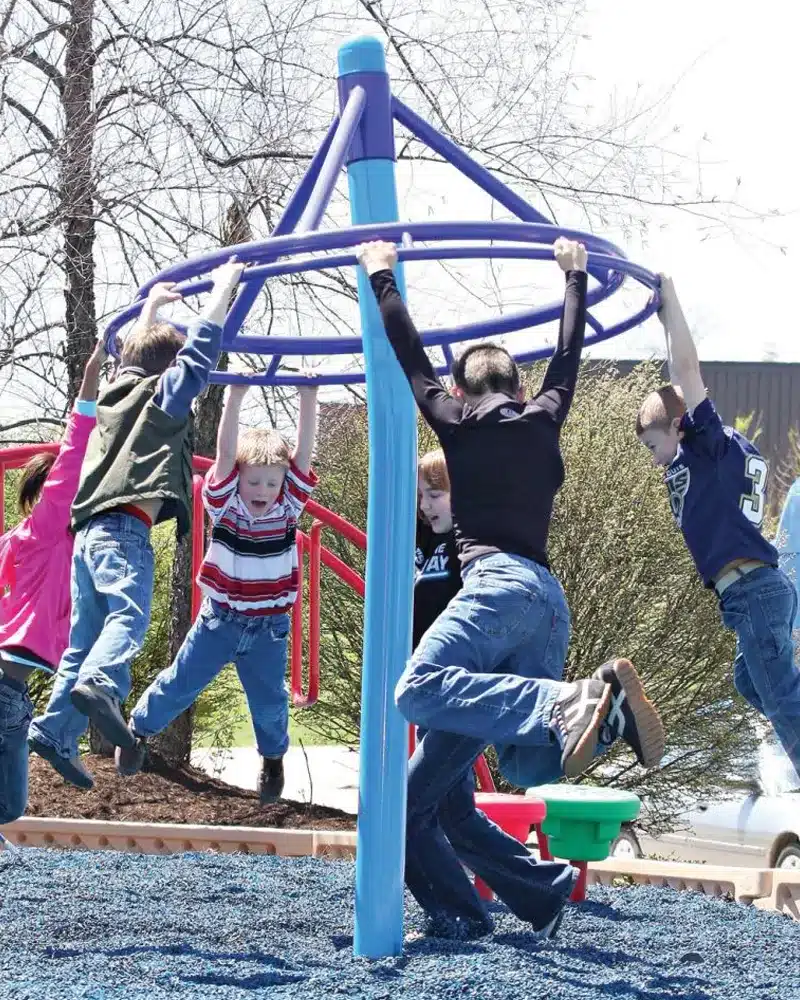
1.Improve Flexibility and Balance
Climbing over obstacles, swinging from bars, and balancing on beams require children to use their bodies in ways that stretch and strengthen their muscles, improving flexibility. These activities also challenge their balance, teaching them to control and stabilize their movements even in motion.
2.Developing coordination capacity
Among the benefits of playgrounds are the wide variety of equipment provided to help children develop motor skills such as running and jumping, grasping and manipulating objects. Through play, children enhance their hand-eye coordination a.
3.Control Your Movements
The dynamic environment of a playground teaches children to control their movements with precision. Navigating through a complex play structure requires careful planning and execution, helping children learn to coordinate their actions and adjust their intensity and direction as needed.
4.Instinct for Improvement
Playgrounds naturally instill an instinct for improvement in children. They see challenges as opportunities to learn and grow, pushing themselves to try new things, master new skills, and overcome obstacles. This mindset, developed in the joyous pursuit of play, is invaluable throughout life.
5.Promote Cardiopulmonary Function
Active play on the playground is great for children’s cardiorespiratory health. Running, climbing and engaging in vigorous play increases heart rate and breathing, strengthening the cardiorespiratory system. Exposure to natural elements and physical activity in the fresh air helps strengthen the immune system, making children more resilient to infections and illness.
6.Muscles are Stronger
Regular physical activity on playgrounds leads to stronger muscles. Climbing, swinging, and jumping engage different muscle groups, promoting muscle growth and strength. This physical strength is foundational for health and aids in the prevention of injuries.
Benefits of Playgrounds for Social Development
In an era where screens often replace the vibrant interactions of outdoor play, the importance of playgrounds in developing essential social skills in children has never been more critical. This shift has led to concerns about children’s abilities to develop necessary social competencies naturally.
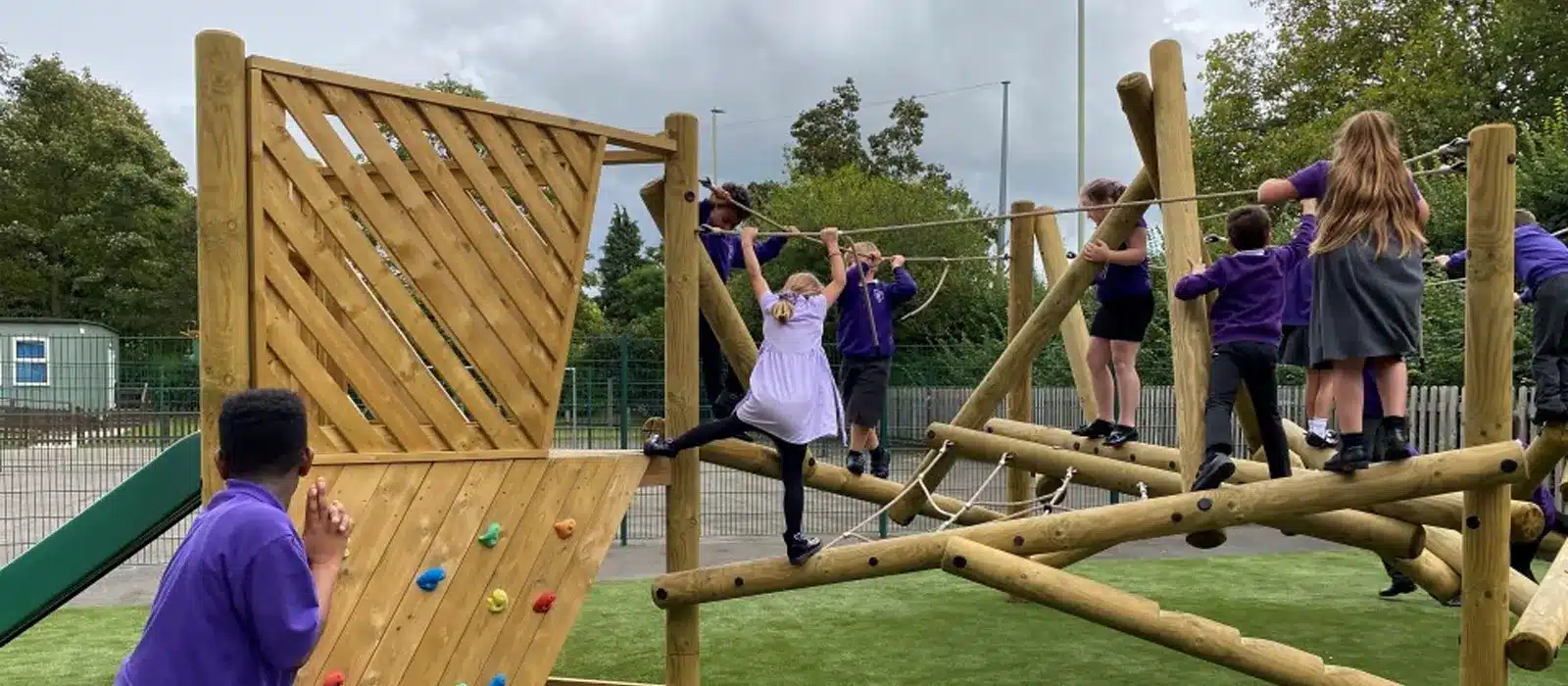
The Relationship Between Children
Playgrounds facilitate the formation of friendships and understanding among children. Through shared experiences on swings, slides, and climbing structures, children learn to communicate their ideas, emotions, and needs. This shared play helps in forming bonds that are foundational for developing social networks and understanding diverse perspectives.
Resolve Conflicts
Conflicts are a natural part of children’s interactions, and playgrounds provide a real-world setting for children to learn conflict resolution skills. Through disputes over whose turn it is or how a game should be played, children learn negotiation, compromise, and the ability to see situations from others’ perspectives
Take Turns and Be Patient
One of the fundamental lessons learned on playgrounds is the art of taking turns and practicing patience. Waiting for a turn on the swing or slide instills patience in children and teaches them to respect others’ opportunities to play, fostering a sense of fairness and equity.
Play Cooperative Games
Games that require teamwork and collaboration teach children how to work together towards a common goal, understand the value of each member’s contribution, and appreciate the importance of collective effort over individual success.
Overcome Shyness
For many children, playgrounds are a safe space to overcome shyness and social anxiety. The unstructured nature of play allows children to engage with peers at their own pace, gradually building confidence in social settings and reducing feelings of isolation.
Sharing and Friendship
Sharing is a social skill developed through playground interactions. Whether it is taking turns using equipment or sharing toys from the sandbox, children learn the importance of generosity and kindness. These interactions build good friendships for the children before.
Benefits of playgrounds for emotional development
In today’s fast-paced world, where academic achievements often overshadow emotional intelligence, the significance of playgrounds as spaces for emotional growth is increasingly overlooked. Yet, the emotional benefits that playgrounds offer are integral to the well-rounded development of every child.
Playgrounds offer rich opportunities for children to develop a broad range of emotional skills, from resilience and confidence to empathy and emotional regulation.
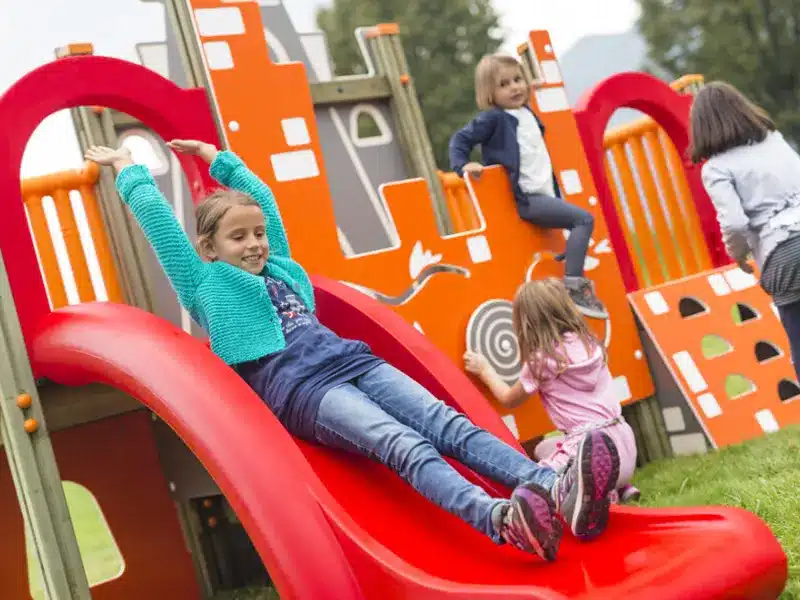
Exploring Emotions
Playgrounds provide a canvas for children to express and explore a wide range of emotions. The joy of sliding, the thrill of swinging, and even the disappointment of losing provide children with tangible experiences of joy, excitement, and sadness. Through these different emotional experiences, children learn to understand and express their feelings.
Managing Stress
Play itself is a powerful stress reliever. Physical activity on the playground releases endorphins that reduce stress and promote a sense of well-being. Overcoming challenges on the playground increases resilience.
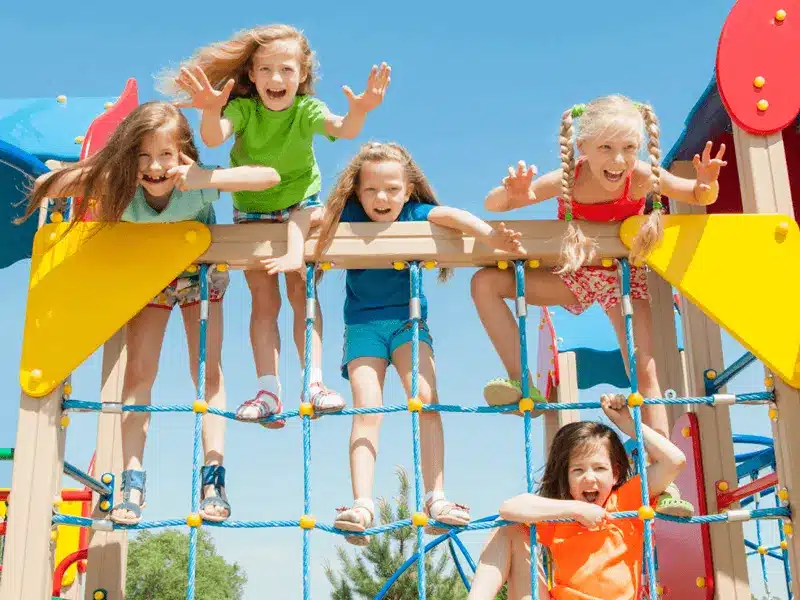
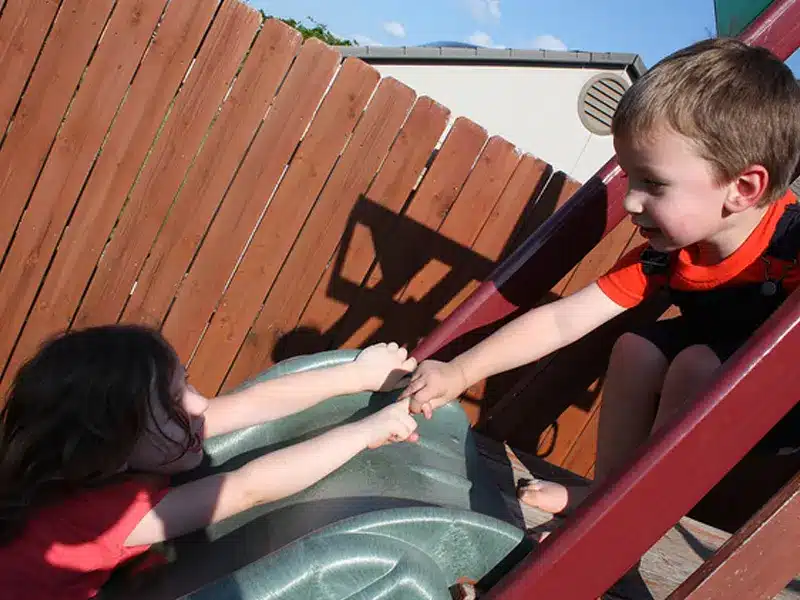
Developing Empathy and Compassion
Interactions with peers on the playground develop empathy and compassion. Through play, children learn to recognize and respond to the emotions of others. Whether it’s comforting a friend who has fallen or sharing the joy of winning a game, playground experiences enrich children’s emotional vocabulary and their ability to connect with others on an emotional level.
Encouraging Risk-Taking and Independence
Playgrounds are safe environments where children can engage in measured adventures. It encourages children to step out of their comfort zones, make decisions, and see the consequences of their actions. Through these experiences, children develop a sense of independence and confidence in their ability to navigate the world.
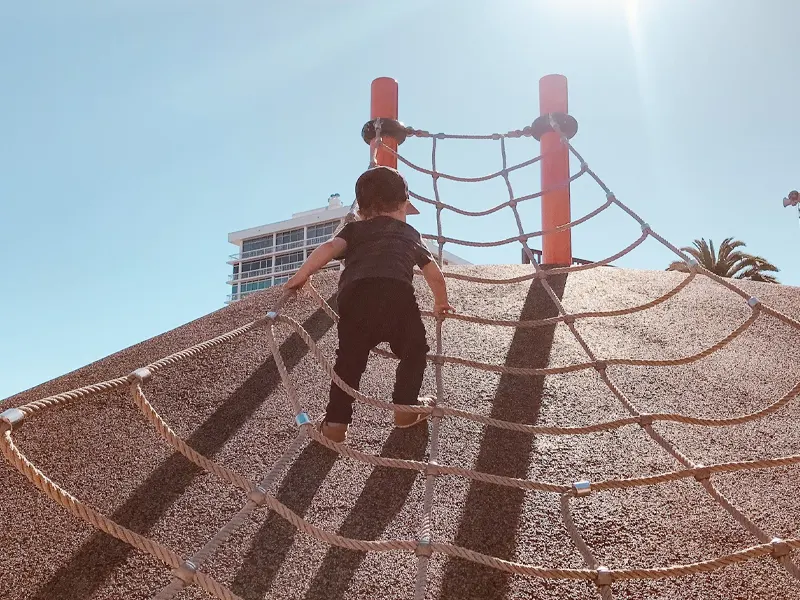
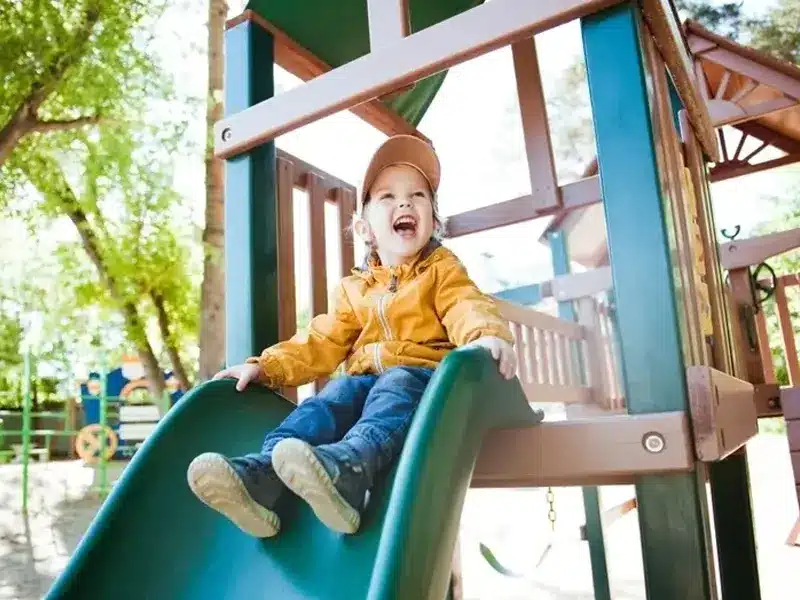
Promoting Joy and Happiness
Perhaps one of the most immediate and profound emotional benefits of playgrounds is the sheer joy and happiness they bring to children’s lives. In an age where childhood anxiety and depression are a growing concern, the simple act of playing can be a beacon of light.
Benefits of playgrounds for sensory development
Playgrounds provide a variety of textures, sounds, sights, and movement experiences that stimulate children’s senses.The sensory benefits of playgrounds are immense and affect all aspects of a child’s development. By being exposed to different surfaces, sounds, and sights, children can refine their sensory processing skills in a natural environment.
Tactile Exploration
- Playgrounds offer a wealth of textures, from the smoothness of a metal slide to the roughness of sand in a sandbox. This tactile exploration allows them to differentiate and respond to different sensory inputs.
Auditory Stimulation
- Sounds on the playground, from the laughter of peers to the creaking of the swings, provide auditory stimulation that contributes to the development of listening skills and auditory processing.
- This environment allows children to experience a range of sounds, from loud to soft, high to low, helping them learn to focus on relevant auditory information and filter out background noise.
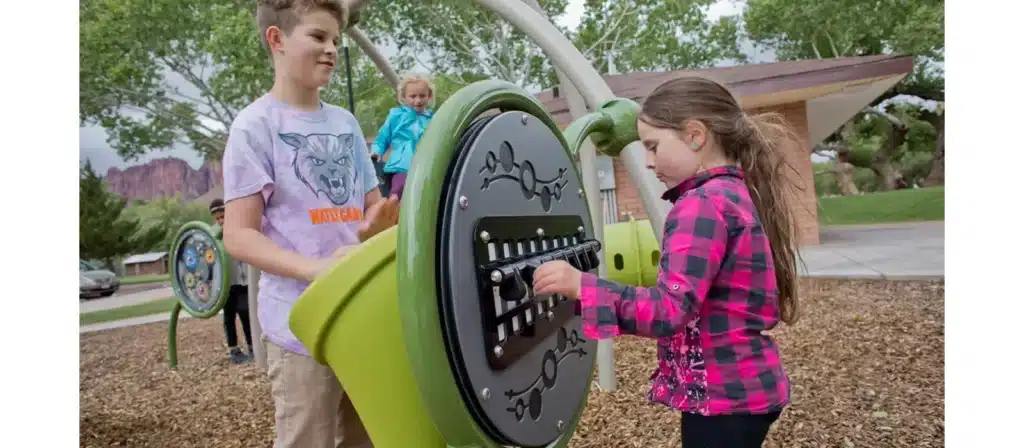
Visual Stimulation
- Playgrounds are filled with bright colors, moving objects, and varied landscapes. This visual complexity helps children develop their visual tracking skills, depth perception, and color recognition.
- Navigating playgrounds requires children to constantly adjust their focus and process moving objects, enhancing their visuospatial awareness.
The playground provides an integrated sensory experience that combines touch, hearing, and sight. It helps children learn to organize, interpret, and respond to different sensory inputs simultaneously. The sensory integration developed through playground play is the foundation for cognitive development, including attention, memory, and problem-solving skills.
Promote imagination
Playgrounds provide an open-ended environment where the only limit is imagination. Here, children are architects, astronauts, pirates or princesses, transforming simple structures into elaborate castles, spaceships or hidden treasures.
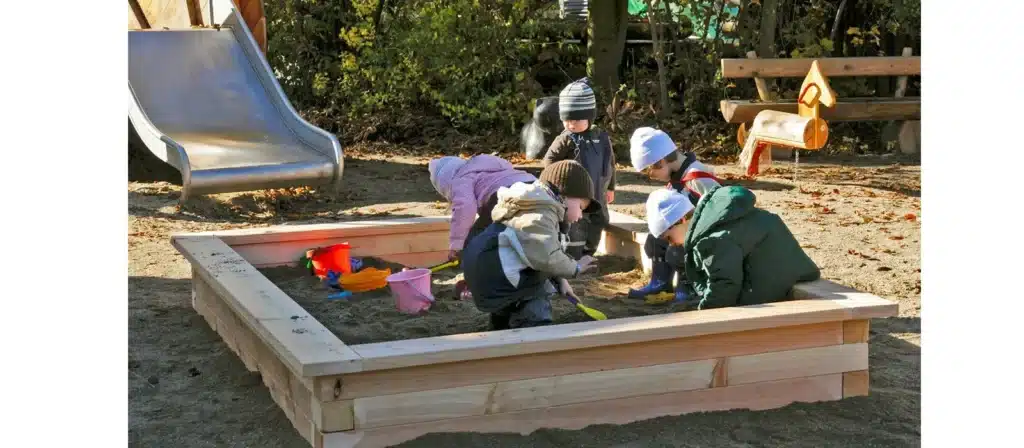
Playgrounds stimulate creative thinking by providing an environment where kids can experiment with ideas, characters and scenarios. Sandboxes become desert islands; slides become waterfalls. This creative play enhances cognitive flexibility, allowing children to think in abstract terms and develop innovative solutions to problems.
Benefits of playgrounds for different age groups
The journey of play is a child’s first foray into learning about the world around them. It’s a multifaceted process that evolves from infancy through to pre-adolescence, each stage tailored to their developmental needs. Understanding these stages not only highlights the importance of play in growth but also aids caregivers in providing appropriate opportunities for exploration and learning.
Infancy
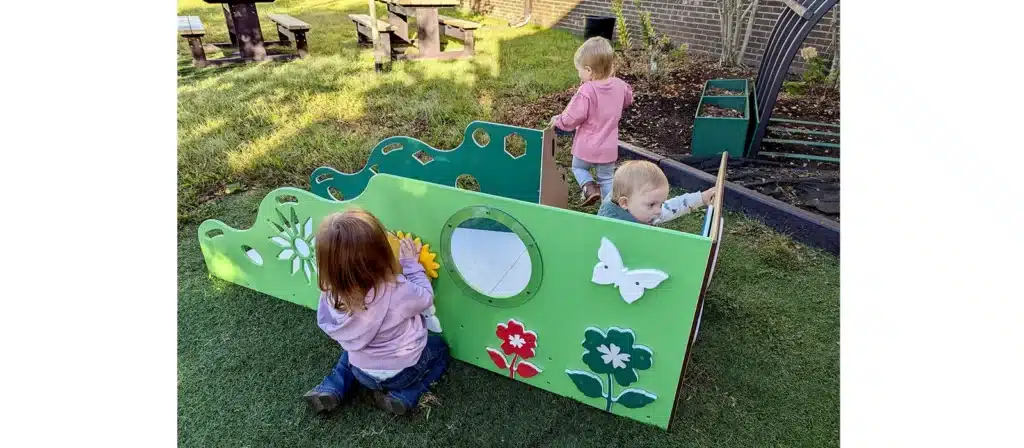
Infancy is characterized by an innate curiosity about the world around them. Initially, infants engage in unoccupied play, where seemingly random movements are actually their first attempts to interact with their environment. This stage is important for sensory and motor development as infants learn to control and coordinate their movements.
As they grow, infants begin to play alone. This self-centered playtime occurs as infants absorb every sight, sound, and texture they encounter.
Toddlerhood
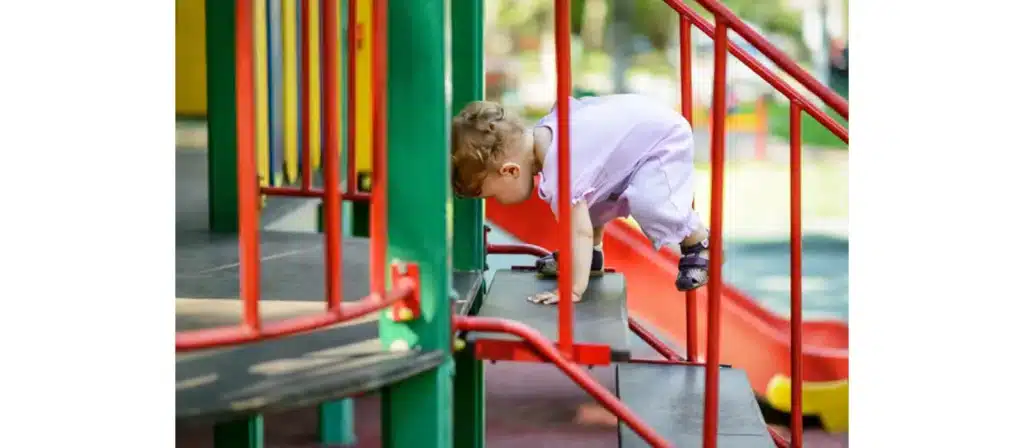
Entering toddlerhood, children begin to observe others, marking the beginning of the bystander play phase. This is a critical time for social learning, as observing peers provides lessons in social norms and behaviors. Although direct interaction may be rare, the foundation for social engagement is being laid.
Parallel play soon follows as toddlers play with their peers without direct interaction. This stage helps develop understanding and empathy for the shared environment.
Preschool
As children move into early childhood, their play becomes more interactive. Associative play emerges and children begin to engage with each other, sharing toys and ideas, but without formal organization of activities. This stage improves communication skills, problem-solving abilities, and the concept of cooperation.

Cooperative play implies a deeper understanding of group dynamics and the ability to work toward a common goal. This is a time when children learn the value of teamwork, negotiation and the importance of rules. Through cooperative play, children explore complex social structures, learn the art of compromise, and develop a sense of moral reasoning.
Older children
In pre-adolescence, play becomes a complex tool for exploring identity and social roles. Children engage in play with complex rules and narratives that allow them to experiment with different roles and understand the wider world. Games like “Simon Says” teach the importance of rules while encouraging children to question and understand how these rules apply in different contexts.
Basic playground equipment helps children develop and grow.
The playground is a developmental powerhouse where each piece of equipment serves as a tool for enhancing various aspects of a child’s growth.
Swings
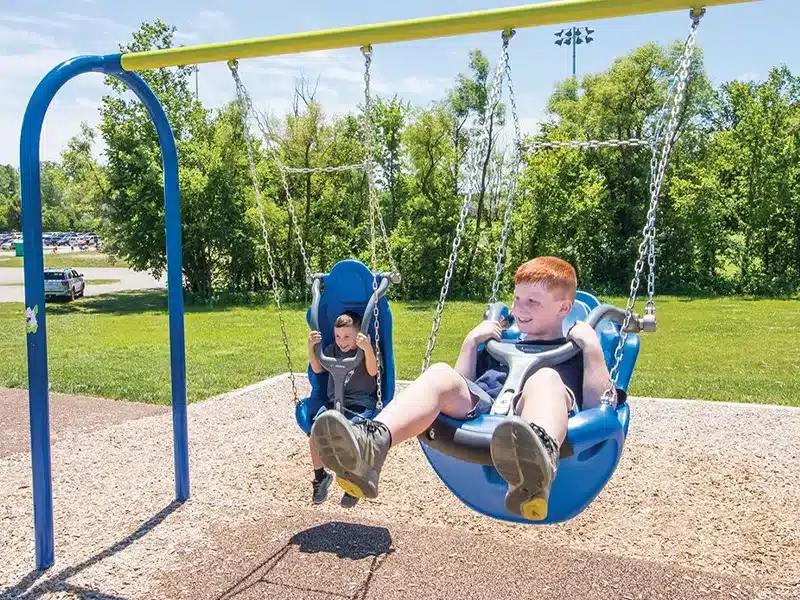
Swings
As children push themselves higher, they learn about gravity, momentum, and the effort required to achieve a desired outcome. The rhythmic motion of swinging helps to understand spatial awareness.
Tunnels
Crawling through a tunnel may seem like a simple game, but it is a complex learning experience. Tunnels encourage gross motor skill development and require children to use their arms and legs in a coordinated way to move forward.
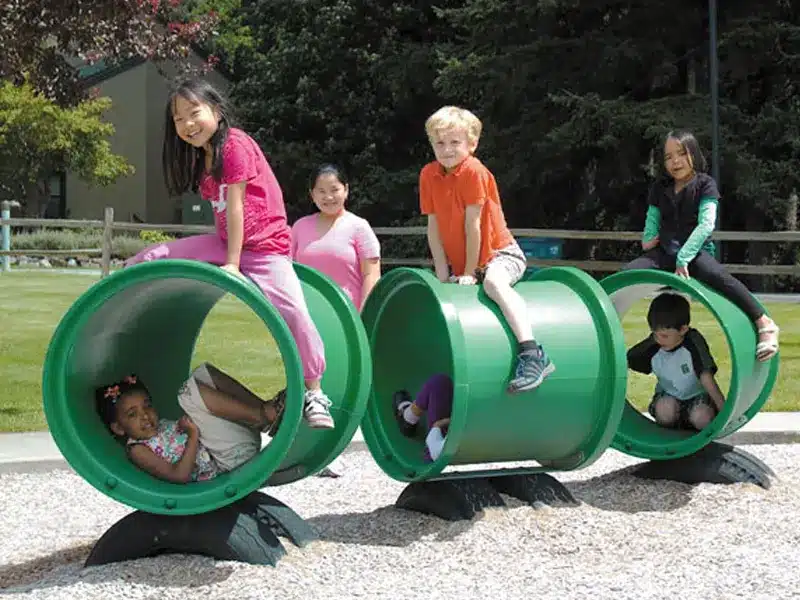

Slides
Climbing up a ladder to a slide enhances gross motor skills and promotes muscle strength, while the slide down helps kids understand basic physics firsthand. Slides also encourage kids to take turns practicing patience, integrating social and emotional learning into physical play.
Monkey Bars
The Monkey Bar challenges kids to swing from club to club, improving their grip, coordination and upper body strength. This equipment is perfect for developing hand-eye coordination and fostering a sense of accomplishment as kids learn to navigate from one end to the other.
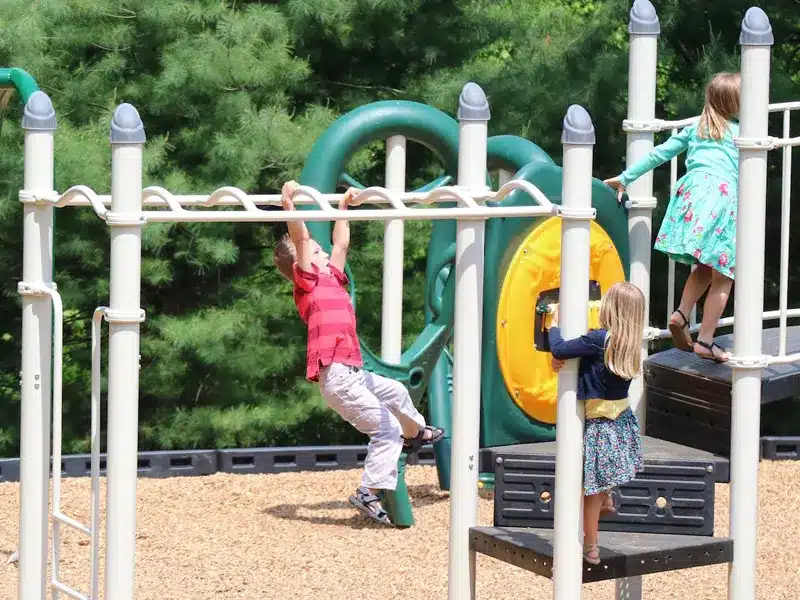
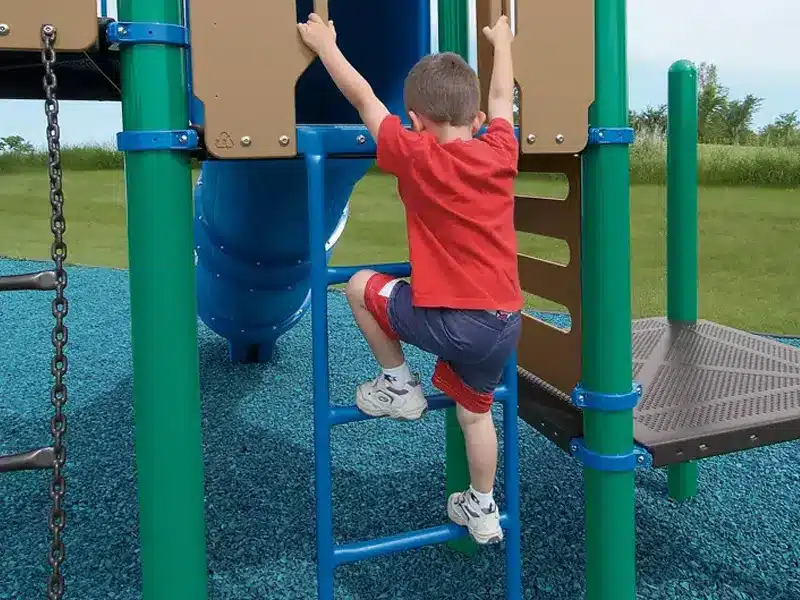
Vertical Ladders
Vertical ladders are a necessity on the playground to promote strength, coordination, and problem solving. Climbing ladders requires children to carefully coordinate their movements, alternating hands and feet to enhance physical and cognitive skills.
The benefits of playgrounds for child development are all-encompassing. By providing diverse opportunities for physical, social, cognitive and emotional growth, playgrounds make a significant contribution to the development of well-rounded, resilient and happy children. As we continue to recognize and invest in the importance of play, we ensure a healthier, more vibrant future for our youngest generation.

